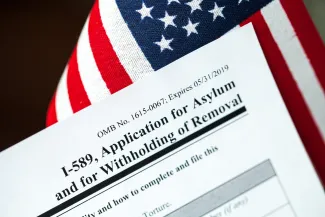
Colorado among 20 states suing to keep Medicaid data away from ICE
A multi-state coalition is suing to keep Medicaid enrollment information away from U.S. Immigration and Customs Enforcement.
Colorado and California joined 18 other states, almost all Democrat-run, in the lawsuit. The coalition is arguing that the mass transfer of this data violates the law by exposing confidential information, which included immigration status.
“The personal healthcare data collected about Medicaid beneficiaries is confidential, to be shared only in narrow circumstances that benefit public health and the integrity of the Medicaid program,” said Colorado Attorney General Phil Weiser. “There’s no reason to share this sensitive data with immigration or law enforcement agencies. We’re suing to protect Colorado’s Medicaid program and the health and welfare of the people it serves.”
The coalition is suing the U.S. Department of Health and Human Services and the U.S. Department of Homeland Security over HHS’s June decision to provide ICE access to Medicaid data.

The government claims the data transfer was made “to ensure that Medicaid benefits are reserved for individuals who are lawfully entitled to receive them.”
“[Trump] promised to protect Medicaid for eligible beneficiaries,” said Homeland Security Assistant Secretary Tricia McLaughlin. “To keep that promise after Joe Biden flooded our country with tens of millions of illegal aliens, CMS and DHS are exploring an initiative to ensure that illegal aliens are not receiving Medicaid benefits that are meant for law-abiding Americans.”
Currently, though federal law does not allow illegal immigrants to enroll in non-emergency Medicaid, data from the Congressional Budget Office showed that at least 1.4 million illegals are enrolled in taxpayer-funded programs, including Medicaid. This is because some states, such as California, Oregon and Colorado, have opted to extend Medicaid eligibility to illegal immigrants.
Republicans argue illegal immigrants should not be eligible for any Medicaid services.
“There are 21,000 illegal immigrants receiving taxpayer-funded health care in Colorado. That’s money that could be going toward care for seniors and people with disabilities,” said Representative Gabe Evans, R-Colorado. “Republicans are fighting to provide care for the most vulnerable who need it … not illegal immigrants.”

The lawsuit, which was filed last week in the U.S. District Court for Northern California, argues that HHS’s decision to transfer the data was unprecedented and carries “serious consequences.”
“In the seven decades since Congress enacted the Medicaid Act to provide medical assistance to vulnerable populations, federal law, policy, and practice has been clear: personal and private healthcare data collected about beneficiaries of the program is confidential,” it states. “Plaintiffs bring this action to protect their state Medicaid programs, and to prevent them from being used in service of an anti-immigrant crusade, or other purposes unrelated to administration of those programs.”
Weiser’s office added to that, stating in a press release that this move is “creating fear and confusion” about the prospect that that information might be used for a “sweeping database for mass deportations and other large-scale immigration enforcement purposes.”
While the coalition says it is pursuing the lawsuit for the protection of personal data, they’ve also highlighted concerns about losing federal funding if illegal immigrants begin unenrolling from Medicaid preemptively.
“States will also ultimately bear the negative public health costs associated with reduced utilization of health care,” the lawsuit states. “Meanwhile, the public will suffer irreparable damage due to increased morbidity and mortality.”
Colorado and California are joined in the lawsuit by Arizona, Connecticut, Delaware, Hawaii, Illinois, Maine, Maryland, Massachusetts, Michigan, Minnesota, Nevada, New Jersey, New Mexico, New York, Oregon, Rhode Island, Vermont and Washington.
The coalition is requesting the court enjoin HHS from transferring Medicaid data to DHS or any other federal agency and enjoin DHS from using this data to conduct immigration enforcement.















